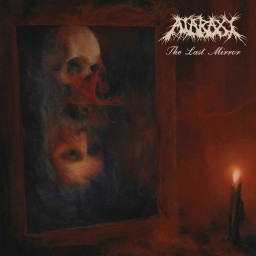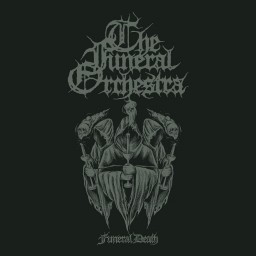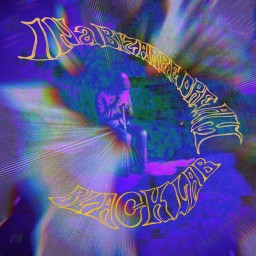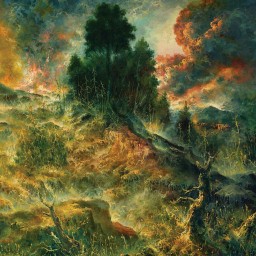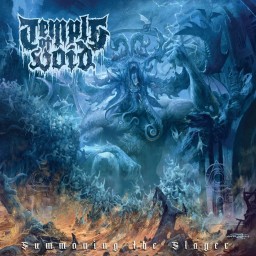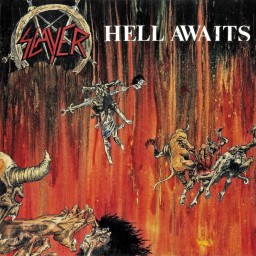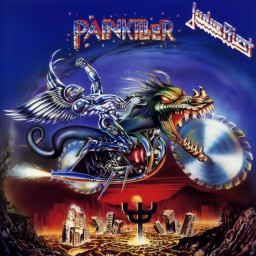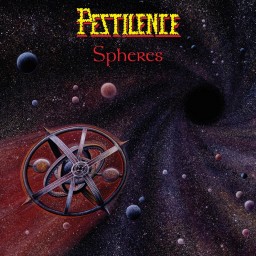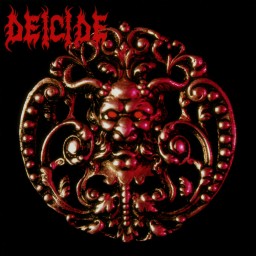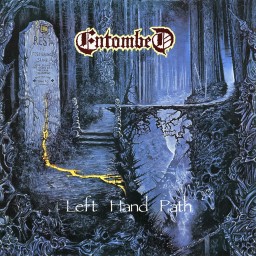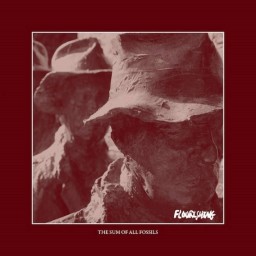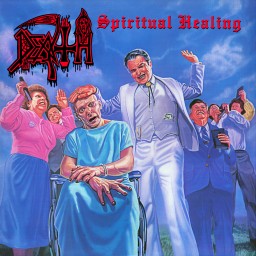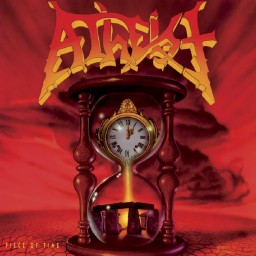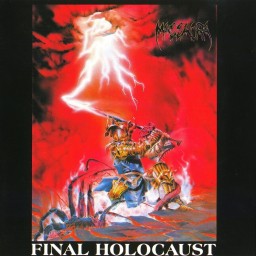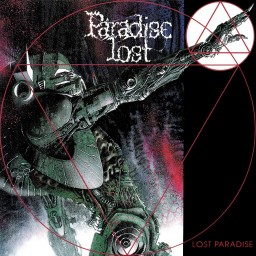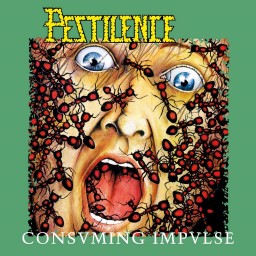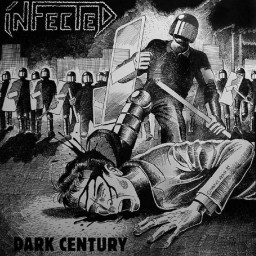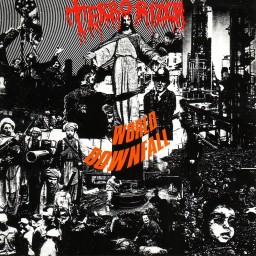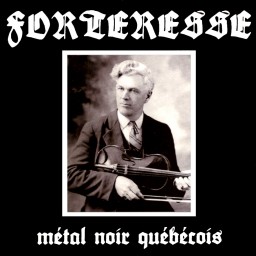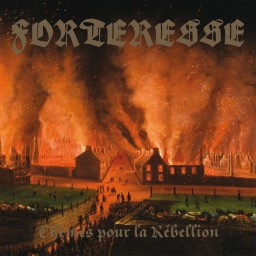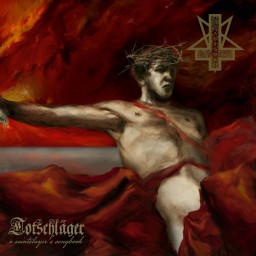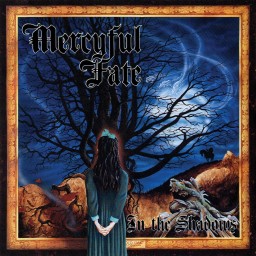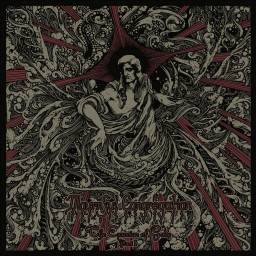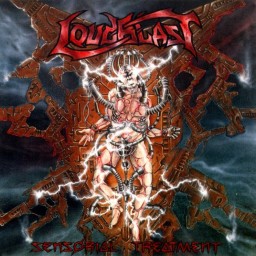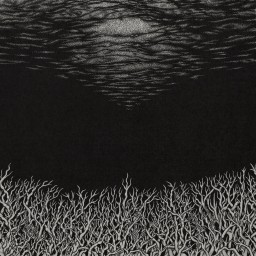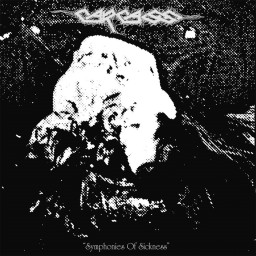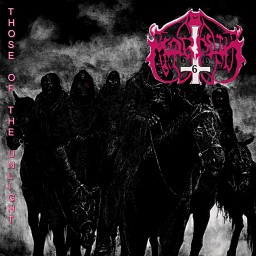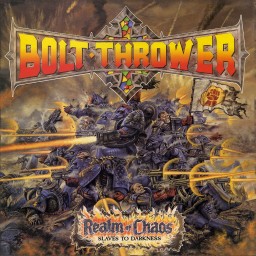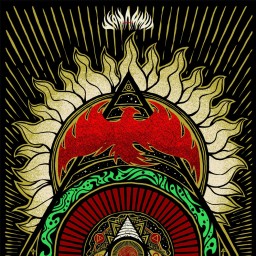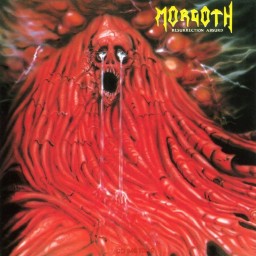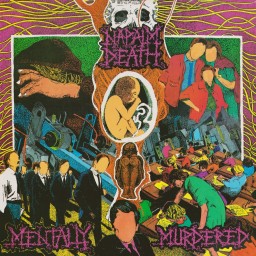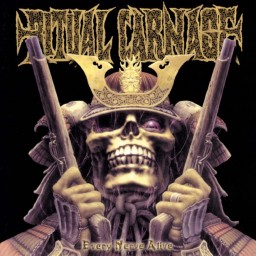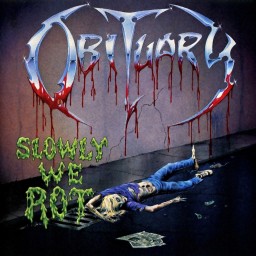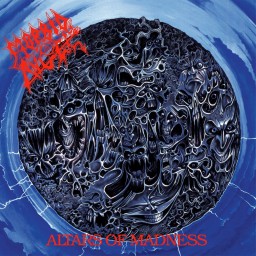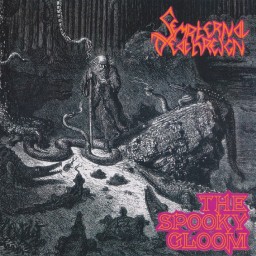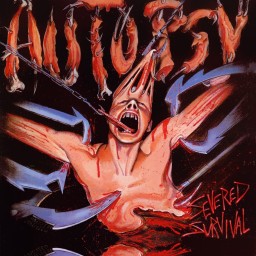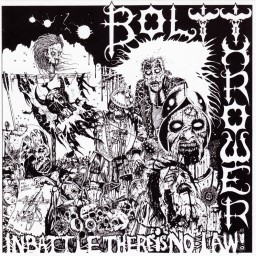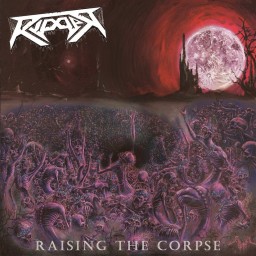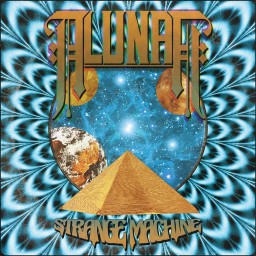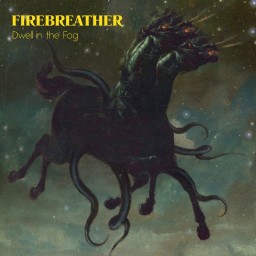Sonny's Reviews
The Spanish death doom four-piece return with their third album, four years on from Where All Hope Fades. They very quickly drop back into the same groove and produce another very accomplished album of doomed-out death metal dirges. If you are here to find something new and original then you are most definitely barking up the wrong tree with these guys, but if you need to feed your downtuned death metal urge then you could do far worse.
The Last Mirror isn't the most brutally heavy iteration of death doom you will ever hear, but there are some pretty good riffs here and the combination of those distorted riffs and cleaner, bell-like lead work is very effective indeed. Vocalist Javi doesn't possess the deepest of death growls, but his vocals have a certain desperate earnestness to them that, along with the cleaner guitar work adds an effective melancholy air to proceedings that works in contrast to the more lethal crunchiness of the riffing.
Overall, if you are want originality look elsewhere, if you are happy to give time to a well-done reworking of firmly established genre tropes then I would definitely say go for it with this.
Genres: Death Metal Doom Metal
Format: Album
Year: 2022
The Funeral Orchestra are a Gothenburg funeral doom three-piece that features Runemagick's Leif Nicklas Rudolfsson on guitar and vocals. I do have some familiarity with the band, but I have only previously heard their debut, Feeding the Abyss, which I dug quite a bit. Funeral Death - Apocalyptic Plague Ritual II actually comprises only one new track which is opener Funeral Death (The Rite Of Winter). The rest are re-recordings of earlier tracks and as such the band consider this not to be an album proper.
Anyway, on to the music itself. It's not the slowest example of funeral doom that you will ever hear, but the sound is pretty massive and it does a good job of crushing and smothering the listener with it's huge, sinister-sounding chords and oppressive atmosphere. There is an occult-laden ominousness to their sound that niggles away at the edge of awareness in an exceedingly effective manner, reinforced by chanted ritualistic-sounding vocals, such as during the superb Flesh Infiltrations or Apocalyptic Trance Ritual. The main harsh vocal sits somewhere between death and black metal, but doesn't sound especially abrasive despite that and the drums have a deep, booming quality that gives the impression of tympani percussion and sound like they are issuing from deep beneath the earth. The overall impression is one of a sinister cult performing forbidden rites in long-forsaken subterranean caverns, beseeching primordial deep-dwelling pit denizens to do their bidding.
I have got to admit to being a little disappointed by this year's doom metal output so far, but The Funeral Orchestra have certainly upped the ante with this and despite the fact that the band don't consider it a full album per se, it is still a stand-out in a fairly mediocre year for the fan of everything menacing, slow and crushing. I'm really looking forward to their next endeavour after this.
Genres: Doom Metal
Format: Album
Year: 2022
I've been a fan of the Japanese stoner metal duo since their debut ep which saw light of day in 2017. They've come a fair way since those early days and have grown in confidence, with their sludgy stoner metal taking on a certain punkish swagger as they raise two fingers to all the naysayers. Coincidentally I have been listening to the new Boris album also this week and the two do seem to compliment each other pretty well. They aren't exactly the same, but they both utilise a riotous expression of stoner metal, Boris drawing on noise rock and hardcore, BlackLab using sludge and punk to achieve a similar aim. In a Bizarre Dream is the more "metal" of the two albums but is a bit less anarchic than Heavy Rocks.
There are some killer cuts here, the opening riff to the single Abyss Woods is a real doozy for example and Yuko's guitar work in general is a treat as she fires off riffs and solos with equal abandon. Her vocals aren't bad either, her harsh howls are nerve-shredding and her cleans have a grungy punkishness to them. Meanwhile drummer Chia provides creditable support, having to propel the tracks forward solo with the duo electing not to employ a bassist (which also adds to the punky diy sound of a track like Dark Clouds.)
The driving Crows, Sparrows and Cats features Stereolab's Lætitia Sadier on lead vocal which adds a different dynamic, she sounds a bit like Nico on the Velvet Underground album, which has a softening effect to the track, making Yuko's heavily distorted guitar sound less aggressive and more trippy. Sometimes the duo throttle things back, such as the crawling Evil 2, but in the main they attack the material with a hefty dose of aggression and leave the impression that these two are seriously not to be fucked with. This is stoner metal for sure, but not in a laid-back, groovy style, but in an in-your-face, fuck you if you don't like it assured manner.
Genres: Doom Metal Stoner Metal
Format: Album
Year: 2022
Epitaphe's debut album, I, was one of my favourites of 2019 and earned itself a five-star rating in the process. So we are now three long war- and pandemic-riddled years on and the French death doomers have unleashed their sophomore, II, upon us (with huge anticipation from me). Luckily for us all their lack of imagination in the titling of their albums is the only area where they are deficient on the imagination front.
Once more the band employ a symmetry in the tracklisting as they did on the debut with a couple of three-minute, gentle instrumental pieces book-ending three nineteen-minute epics. II seems to be primarily tagged as progressive metal, but I am not entirely sure if that tagging is appropriate, chiefly because I don't know if a huge percentage of usual progressive metal fans would love this. I think of it more as death or death doom metal release that has some progressive tendencies, particularly in the songwriting department, rather than an actual prog metal release. The progressiveness here doesn't amount to overindulgence or technical showiness that bedevils so many releases labelled as prog metal, but is merely a convenient label to describe the convoluted songwriting. One thing is for certain, Epitaphe certainly employ an impressive arsenal of extreme metal tropes to achieve those songwriting aims. Vocally they run the whole gamut from deep, rumbling death metal growls to clean doom metal singing to harsh sludgey howls, back to soft, clean vocals similar to Mikael Akerfeldt's cleans on a track like Face of Melinda. Musically there are brutal death metal riffs, thick, sometimes melodic doom metal riffs, subsonic OSDM riffing and a plethora of blastbeats. All this multitude of weapons in the Frenchmens' arsenal are skillfully deployed with some excellent songwriting that, despite all the twisting and turning, is still fundamentally heavy as fuck! These lengthy tracks are not the slow-build, increasingly formulaic musings of the atmo-sludge wave, but tracks that rise and fall less predictably, ranging from intense explosions of brutal death metal savagery to calm and serene pastoral sections and artfully displayed technical prowess.
II is not an album for the impatient metalhead, but is a technically impressive (in both songwriting and performance) release that does not skimp on sheer aggression and heaviness when the music calls for it, but also contains plenty of nuances and variety. More challenging extreme metal releases can often, by their nature, be quite alienating with a tendency towards dissonance and angular song structures, but Epitaphe, much like Mikael Akerfeldt's Opeth before them, produce complex and challenging music that doesn't alienate the listener, but rather entrances and mesmerises them. This latest album should definitely cement Epitaphe's reputation as a metal band of immense ability and one of which to take note.
Genres: Doom Metal Progressive Metal
Format: Album
Year: 2022
I've been an ardent supporter of the Detroit five-piece for some time now and previous full-length, The World That Was, was one of my favourite albums of 2020 and one I purchased on vinyl such was it's quality, so obviously I was really looking forward to Summoning the Slayer. So how does the latest album shape up in comparison to it's earlier brethren? My initial reaction was that Summoning the Slayer was a bit underwhelming, but subsequent listens have seen me modify that stance. I think that I was experiencing a case of reality being unable to live up to expectations, so was initially too harsh in my reaction. Summoning the Slayer takes the band's melodic death doom template from their earlier work and this time around go down a more gothic-led path than the spacey/psychedelic trip they took on The World That Was. I am often more than a little ambivalent towards gothic metal, so that may also explain my initial reticence regarding the new record I suppose. To the band's credit, they incorporate the gothic trappings exceedingly well and don't fall into the trap of overdoing it and tipping over into excessive theatricality than ruins so much gothic-flavoured metal for me.
The album starts off strongly with Behind the Eye, a fairly straight-up slab of cavernous death metal which is followed by possibly the highlight of the album Deathtouch which is where the gothic guitar work first makes an appearance. The lighter melancholic tone of the gothic lead guitar works in marked contrast to the heaviness and crunch of the riffing and the guttural growling of excellent vocalist Mike Erdody to provide an extremely satisfying blend of light and dark motifs. I don't want to oversell the gothic side of the album as this is still overwhelmingly a (fairly melodic) death doom album but the band do like to bring in elements from other styles into their songwriting, such as the space and psychedelic rock they utilised on their previous album. Ultimately it comes down to whether Temple of Void have the necessary heft behind them to convince as a death doom outfit and I think they illustrate once more that indisputedly, yes they do, being an exceedingly tight and proficient unit with superior songwriting ability. Kudos to them that they have no desire to keep trotting out the same LP over and over again, but whilst trying out new sounds refusing to abandon what appealed to their growing legion of fans in the first place. True, Summoning the Slayer may be more of a grower and less an immediate rush than previous releases, but those pesky increased expectations must come with the territory for any decent band I suppose and the quality does ultimately win out over any initial hesitancy.
Genres: Doom Metal
Format: Album
Year: 2022
Hell Awaits was the very first Slayer album I bought as I expanded my thrash metal awareness beyond Metallica's first two albums. It is probably my least favoured of their first three albums. I love the youthful exuberance of the debut (and it contains The Antichrist) and Reign in Blood is the greatest thrash album ever. But even despite that, Hell Awaits is still a fucking top-tier thrash metal release and most bands can only dream of producing something this awesome.
When first listening to it all those decades ago it was, without doubt, the darkest album I had ever heard, with lyrics about hell, demons, serial killers and vampires, not in some tongue-in-cheek, Hammer Horror, camp-it-up style, but in red raw, visceral glee. Being the time, in the UK at least, of the video nasty laws banning "extreme" horror videos, it was hard to believe this was even allowed! Hell Awaits was most assuredly the biggest knee in the bollocks to the shiny glamour of the new romantics, hair metal and stadium rock that was proliferating in the mid-eighties and sowed the seeds, both musically and thematically, for much of the extreme metal that was to follow. This was most definitely an album and a band I could get behind.
Funnily, for a band as direct and in-your-face as Slayer, some of their most awesome tracks have an extended intro. I'm thinking Seasons in the Abyss, Raining Blood and, most pertinent to this review, the opener and title track, Hell Awaits, with the faded-in build-up and sinister backwards chanting of the intro. When the riff breaks and things begin in earnest, Tom Araya spills out words of an impending conquering of heaven by the hordes of hell, as if he was some old testament prophet in the throes of delivering demonically-inspired prophecy, fighting to impart the visions he has seen in a flurry of verbiage he can barely control. Add to this the increased intensity of guitarists Hanneman and King, their riffs bludgeoning metalheads worldwide insensible even as their solos left behing trails of blistering flesh, so white-hot were they. This was the first time I had heard solos so intense that it seemed like the Slayer duo had weaponised the art to the point that it could cause physical harm! Drummer Dave Lombardo had also grown exponentially in stature and confidence, although his tour-de-force was still an album away, and he and Araya's (very prominent) bass underpin and punctuate the two six-stringer's lethal assaults.
I think it is safe to say that this is an underappreciated album, which I am as guilty of as anyone. It feels like a quantifiably superior album to Show No Mercy with better performances, songwriting and production, yet I have a fondness for the debut that, irrationally, I don't feel for Hell Awaits on the same level - even whilst recognising it as a great album nonetheless. People are just weird I guess.
Genres: Thrash Metal
Format: Album
Year: 1985
Judas Priest were one of my favourite bands and produced a couple of my all-time top albums in Sad Wings of Destiny and Stained Class (with Sin After Sin and Killing Machine close behind). However, after the release of Killing Machine and the success of the single Take On the World something changed with Priest. To my mind at the time and an opinion I hold to this day, they sold out and selling units became more important than everything else. They took advantage of the upsurge of popularity of heavy metal here in the UK, since labelled the NWOBHM, by upping prices on concert tickets and merchandise, vitually doubling them on the Killing Machine tour compared to the prices on the Stained Class tour. Much as that irked me at the time that was as nothing compared to the commercialisation of their music signalled initialy by the British Steel album and it's focus on producing hit singles in the vein of US acts of the time in a blatant attempt to break into the American market. At this point I turned my back on Priest as I considered that they were taking the piss along with my hard-earned cash. My first wife bought the Screaming for Vengeance album but I didn't care much for it. Other than the title track and Electric Eye I thought it sucked to be honest and I didn't listen to another new Priest album for a very long time indeed.
Anyway, turning to Painkiller, I have always understood why it is so beloved of fans, following the execrable Turbo and Ram it Down pretty much anything half-decent would be an improvement and indeed it is, but I still maintain it is sub-par when compared to the band's earlier releases. Now I can hear your protests and you may as well save your breath because you will never convince me otherwise. "But Mike, Priest were barely even metal before Killing Machine" you might say, to which I will retort with the well thought-out counter-argument "bollocks!" There are some really good songs on Painkiller - Night Crawler, Between the Hammer and the Anvil and All Guns Blazing for example, but do any of these even touch, Sinner, Tyrant, Victim of Changes, Beyond the Realms of Death, Starbreaker, Exciter and more? Not even remotely in my book.
So the tracks are pretty good in the main, but a couple of things really kill my pig with Painkiller. Firstly it's the production which still retains a significant amount of that eighties sound beloved of AOR acts like Journey and Starship, particularly when there are keyboards involved, such as on the commercial-sounding Touch of Evil. The drums, whilst in themselves are pretty good, are too often made to sound like Phil Collins on his In the Air Tonight hit single. The other bugbear I have is Rob Halford's bizarre decision to sing a couple of tracks, including the opening title track which is otherwise brilliant, in a permanent falsetto when they would sound at least half as good again if he had just sung them normally.
Despite all this negativity, I do still rate Painkiller. The guitar work of Tipton and Downing is excellent with some great riffs and even better solos and even I must admit that the guitars benefit enormously from the production job. When Halford dispenses with the King Diamond-like enforced falsetto and sings naturally his voice still sounds great as well, so there is plenty to appreciate. I'm sorry though, but I just don't buy into the hype with Painkiller. As I said earlier, I get that it was an oasis in a sea of crap that was the Judas Priest of the mid-eighties onwards, but that is judging it against a pretty low-set bar. Personally, I rate it no higher than fifth best Priest album - it is solid, but it's not great. So sue me!
Genres: Heavy Metal
Format: Album
Year: 1990
Well that was... unexpected. I'm a big fan of Pestilence's first three albums, but I had never listened to this last album of their first iteration before this month's feature. I am aware that it is an album that has split the Pestilence fanbase and is less well-regarded than their previous releases. I can understand why that is and if I had been a Pestilence maniac at the time I would probably have agreed. Of course I am more open-minded these days and more understanding of bands wanting to try new directions rather than forever recycling the same old tropes. But even so, it genuinely took me by surprise and marks a major departure for the band as they tried to produce a unique record that may have taken death metal in a new direction.
Even the tracks that sound most like Pestilence's earlier works sound different, coming off more like metal-era Killing Joke than Morbid Angel with a hint of an industrial sound to them - and that is only the beginning of the departure! I believe the band cited a number of influences for Spheres, among them Bill Bruford and I would suggest Robert Fripp too as I can definitely hear a King Crimson influence on tracks like The Level of Perception and Soul Search. The album as a whole is more progressive and technical than you would ever expect from a band with Pestilence's previous output, being far more ambitious songwriting-wise than almost any other metal band of the time.
All this is even before we discuss the short pieces that mark the band's biggest departure from the norm. Aurian Eyes is a classical strings-led short piece of chamber music, Voices from Within sounds like a piece from Vangelis' Blade Runner soundtrack album and Phileas is a gentle guitar piece. In addition the four-minute track Personal Energy is a love song to seventies English prog and my personal favourite, the title track, is a sublime mix of death metal and space rock. I'm not sure that I have heard another album quite like Spheres and certainly not from the early nineties and you know what, the more I listen to it the more I get into it. Departure for Pestilence it may be, but a dip in quality? I think not.
Genres: Death Metal Progressive Metal
Format: Album
Year: 1993
Deicide are one death metal band I have been quite familiar with for quite some time, mainly due to a workmate who loaned me their first three albums when I returned to metal in the late nineties. Led by the inverted-cross branded, religion-despising, bassist/vocalist Glen Benton and featuring the Hoffman brothers on guitar I found Deicide to be an intimidating proposal and, in all honesty, back then I wasn't particularly keen as I found them far too abrasive. So, it's a measure of how far my taste has changed in the intervening twenty-odd years as, listening to this now, I found an awful lot to appreciate and actually really enjoyed it in a fuck-everything kind of way.
On this, their debut, it is evident that Deicide had no intention of fucking around. Ten tracks and a runtime just a bit over half an hour, this is a release that hits fast and hits hard. The memorable riffs are exceedingly tight with a really cool guitar tone, the drumming of Steve Asheim is devastating and precise and Glen Benton's vocals spit bile and venom at his preferred target of organised religion with a genuinely disturbing spite and evil-sounding growl. Deicide is an album that is trimmed of all fat and is made of nothing but muscle, bone and gristle, getting straight down to business and never diverting from the path of intimidating and scaring the living shit out of anyone and everyone. The Hoffamn's solos are not really anything more than functional, but this album isn't about anything as superfluous as fancy guitar solos - it is pure distilled essence of death metal and as such may actually be toxic if taken internally.
But seriously, Deicide have had quite an inconsistent career and Glen Benton hasn't always been the most likeable individual, but on their debut they instantly got to the very core of death metal, illustrating an inate understanding of what it meant and creating an absolute textbook release that could be held up as an example for future generation of death metallers. If a band were getting too pretentious or arty-farty for their own good then they could do worse than sit themselves down with a copy of Deicide to reconnect with the beating heart of death metal and shear themselves of any unwanted pretentions. All-in-all an exciting and dangerous-sounding album that is the sort of release that reminds me why I got into metal in the first place, all those oh, so many years ago.
Genres: Death Metal
Format: Album
Year: 1990
So, armed with my new-found knowledge of the Swedish death metal sound (thanks Ben and Daniel for enlightening me), I turn to Sweden's Entombed and their debut Left Hand Path. Now that it's been pointed out, the difference between the mainly US death metal that went before and the more heavily distorted sound produced by these Swedes is pretty obvious, even to my untrained ear. At the risk of being lambasted for such heresy, for me, this increased distortion and the wall-of-sound it creates (the buzzsaw sound) is a large distraction from the riffs, which feel like they are buried under a thick layer that takes away from their efficacy. A further result of this is that the lack of definition in the riffs means that the songs then seem to blur into one another and rob them of their individuality. Now, don't get me wrong, I'm all for heavy distortion (you can't be as big a doom fan as me without it) but I really don't feel it particularly adds anything to the death metal sound and this lack of definition in the riffs robs them of their power to my ears. That said, this does not make Left Hand Path a poor album, but I found I had to approach it from the point of view of the overall effect of it as a whole rather than focussing on individual tracks, the diversity of which isn't massive. When taken as such it is a fairly evil-sounding release and that guitar sound does have a kind of hypnotic effect if you stop trying to differentiate the riffs and let it just overwhelm you, a lot like listening to the droning of a large (angry) bee colony.
The rhythm section seems pretty solid, if not spectacular and the growls are suitably gruff and threatening. The lead guitar work though is possibly my favourite part of the album and the solos seem to have lost the chaotic, Slayeresque aspect of so many predecessors and, in fact, sound far more like the work James Murphy put in on Death's Spiritual Healing.
Overall, I understand why Entombed are beloved by death metal fans, their sound was certainly a new direction for death metal at the time, but I prefer the greater clarity of the US sound or, at the very least, the all-in atmospheric representation of decay and death as peddled by the likes of Autopsy and Sempiternal Deathreign.
Genres: Death Metal
Format: Album
Year: 1990
Well this was really interesting and a pleasant surprise. After the first few bars I thought we were in for another dissonant release of the kind I struggle with, but although this does dabble with dissonant elements, it has more going on than just that. Here Flourishing infuse their death metal with elements from outside of metal circles, post-punk and noise rock for example, and so provide, at least in my experience, a unique and refreshing take on extreme metal. The Sum of All Fossils is an album of contrasting textures, but that work together exceedingly well, be it the cloying and suffocating layers of their dissonant death metal, or the more expansive post-punk-inspired sections and the abrasiveness of the noise rock / post-hardcore passages. The transitions between these various textural contrasts are also handled masterfully. There was quite a few times when I was reminded of Akercocke's Words That Go Unspoken, Deeds That Go Undone album, particularly with how some of the transitions were handled.
The vocals feel a little buried at times, which isn't so much of a problem for the death growls (which often sound to be more of a black metal shriek), but the post-hardcore cleans sound a bit like they are fighting against the tide. The band's use of dissonance isn't especially overbearing, luckily for me as I find an excess of dissonance to be off-putting, but is tempered by the more melodic passages derived from the non-metal genres. Technically, it all sounds very much to my non-musician's ear like these guys know their way around their instruments and the songwriting is adventurous and exhilarating.
For me, this was a genuine revelation and although it isn't a perfect release for my particular sensibilities, it is one that has impressed me mightily and is definitely one I can see me revisiting in the future.
Genres: Death Metal
Format: Album
Year: 2011
Spiritual Healing is one of the two Death albums I was still yet to listen to prior to this (the other being The Sound of Perseverance). There is a certain degree of progression throughout all of the Death discography and here Chuck Schuldiner decides (for Death were a band in name only and were essentially Chuck and a band of hired guns, all band decisions taken by he alone) on a stylistic departure from the first two albums. Gone are the cartoonish, horror-themed lyrics and cover art of SBG and Leprosy and in comes actual horrors from the real world - drug addiction, mental health issues, even abortion and the death penalty all come in for scrutiny from Chuck's lyrical examination. This lyrical evolution being just one of several obvious indicators of his increasing maturity as a songwriter and his refusal to keep retreading the same ground.
Death had pretty much established and refined the definition of death metal with their first two classics, but it is clear that Chuck wanted more. He had ditched guitarist Rick Rozz because he wasn't willing or able to go along with that ride and brought in the technically more impressive Hallows Eve guitarist James Murphy. The songs on Spiritual Healing have a greater level of complexity than on the first two albums, not exactly progressive, but certainly not mere simplistic head-banging material, most consisting of multiple riffs, tempo changes and guitar solos.
The overall sound is much clearer than previously and the guitar tone is great with a chunkiness that allows the stellar riffs to hammer home but is also precise and clean allowing James Murphy's shredding solos to absolutely slay. His soloing is arguably the most enervating and melodic in all of death metal up to this point, sounding more influenced by classic heavy metal guitarists than the Slayer duo of Jeff Hanneman and Kerry King that most death metal guitarists of the time referenced. Chuck's vocals are great and sound better than ever here, his earnest gruffness exemplifying the best of death metal singing at the time. Terry Butler turns in a solid performance on bass and Bill Andrews comes in for his usual technical kicking by those who know better than I, but Spiritual Healing is all about those riffs and solos, the functional rhythm section merely providing a base.
I have pointed out recently that there were a few albums released around this time that were really solid workouts but which didn't live long in my memory after they had finished (Massacra and Carnage to name a couple) but that is an accusation that certainly can't be levelled at Death. The opener Living Monstrosity, the title track and my personal favourite, the convoluted Low Life with its insane solos, all had enough personality to keep them running through my mind long into the night! All in all I loved this album and it is yet another key to the lock that was my previous misunderstanding of how amazing Death were as a legendary metal outfit and the influence that Chuch Schuldiner had on the world of death metal. In fact I find it almost impossible to reconcile where I now stand with my previously held beliefs about Death.
Genres: Death Metal
Format: Album
Year: 1990
I'm not the biggest champion of technical death metal to say the least and Piece of Time is an album I have heard before, without it really making much impression on me. So I went into it this time with a determination to get to the bottom of why it is so well-received and simultaneously to try to get something out of tech-death that has eluded me in the main up to this point. The first thing that leaps out at me is that this is quite obviously a unique record for early 1990 and, to use a much-abused cliche which is actually true on this occasion, it genuinely sounds ahead of it's time - maybe it should have been entitled Piece Out of Time! OK, so I don't know what I was thinking when I originally rated this as a 3/5 because I got far more out of it this time around than that score suggests, so it is definitely long overdue for a reappraisal.
Firstly, this is not that overtly technical as I have come to understand the term. I associate the phrase "technical" metal, be it thrash or death metal, with unlistenable time changes and excessive guitar wankery, bass lines bursting in and out seemingly at random and a drummer who desperarely seems to be trying to make up for the fact that he is the drummer! In other words a general lack of the things that originally drew me to metal music - riffs that will blow your bollocks off at fifty yards. For me "technical" metal (as opposed to progressive metal) is more for students of music theory and those who understand what the musicians are about - which I can assure you does not include me - rather than a visceral, emotional experience which is much more what I look for in music. So either I have completely misrepresented tech-death in my own mind or this isn't as technical as I thought it was because this has got some awesome riffing and the technical work is nothing like as jarring as I have found it elsewhere, being more interesting than annoying to my more literal way of thinking.
Basically, on Piece of Time, Atheist have taken the nascent death metal genre as a foundation and recast it with a completely different approach from the full-on brutalisation of Morbid Angel, Autopsy or Obituary, producing the tightest-sounding death metal album released up to this point. The technical, jazzy showcasing does definitely rear it's head at many points, but it never seems to be merely for it's own sake and it never disrupts the flow of the tracks which is where I think many tech bands go wrong when they sacrifice the songs upon the altar of technicality. Anyway, I have harped on about the technical nature of Piece of Time for long enough now - what we really have here is a super-energetic death metal album that is full of life and is a powerful representation of what can be achieved when a band take a different approach to what is becoming established as the norm in any given genre without sacrificing what has made that genre so appealing in the first place. The guitar work is exemplary, the riffs and leads are plenty aggressive as are the vocals spat out by Kelly Shaefer whose delivery is especially venomous-sounding. The drums and bass are given more freedom than usual up to this point, but this certainly doesn't undermine their ability to propel the tracks forwards, rather they enhance the lead work with interesting contributions of their own.
In conclusion, I have got to say that I was originally very, very wrong about Piece of Time and, having stripped away the prejudices the "technical" tag produce in me, can now see it for the ground-breaking and original piece of work that it really was and found myself enjoying it immensely.
Genres: Death Metal
Format: Album
Year: 1990
Massacra's debut marks the point at which the French throw their hat into the death metal ring and try to stand toe-to-toe with the big boys. Final Holocaust epitomises that death/thrash crossover sound that was a hallmark of the late-eighties' transition from brutal thrash to death metal and is an aggressive and relentless blast through ten tracks of vicious and venomous death metal that still maintains a significant proportion of thrash sensibilities, the Teutonic influence of Kreator being particularly apparent I would suggest. There are some cool riffs and solos with energy aplenty to be found within the ten tracks, but unfortunately I don't find that much of the album "sticks" with me. Don't get me wrong, I find Final Holocaust to be a really good blast while it's on, but by the time you get halfway through most of the tracks start to blur one into another and the second it stops I have trouble recalling any of the songs. I really don't want to be too critical because I have heard far worse albums, but this lack of memorability is a significant stumbling block. Would I put it on in preference to Kreator, Slayer, Morbid Angel or Death? No of course I wouldn't, but I wouldn't turn it off and replace it with something else if it was already on either because there is plenty here that I enjoyed. Not every album can be earth-shattering or life-changing, but Massacra do what they do extremely well and deserve some praise for what is a consistent and energetic release. I have been getting more from it the more spins it receives, yet I still struggle to recall many of the tracks later, so maybe it's just me.
Genres: Death Metal
Format: Album
Year: 1990
February of 1990 saw the release of an album that I have found to be very interesting indeed - Paradise Lost's debut, Lost Paradise. I have hardly been reticent in my oft-spouted dismissal of a fair bit of the output of the so-named Peaceville Three, but this is a whole different kettle of fish entirely. Anyone, like me, approaching this after hearing their later gothic death doom output first may be a little wrong-footed by the rawness of this debut. It takes the downtuned and dirty approach of Autopsy's Severed Survival and slows it down further, incorporating even more Sabbath/Pentagram doom riffs and as a result turn in a slab of very early death doom which would go on to be extremely influential, certainly upon the UK death doom scene but further afield too. This is quite a different beast to the band's subsequent releases, with their gothic leanings, which are virtually non-existent here other than a few seconds of haunting female vocals during Breeding Fear.
I was particularly impressed by Nick Holmes' phlegmy, guttural growl which is a great iteration of death metal singing and one I would like to hear in a more conventional death metal setting. I see he also provides vocals for Bloodbath (after replacing Mikael Akerfeldt) a band I have inexcusably never listened to yet, so I think I will have to give them a shot to see if he is as effective with a more direct death metal style, as I suspect he may be. Despite Holmes' impressive vocals, I think it is quite apparent that Lost Paradise is the product of a band who are still finding their way, learning their craft and searching for an identity of their own. It is a raw-sounding album, there are plenty of decent riffs and guitar phrases and the slower tempo and doomy atmosphere add a different dimension to the death metal template, exploring this avenue even further than forerunners Autopsy and Sempiternal Deathreign and giving a good pointer to the direction Paradise Lost intended to take their sound.
At first I didn't really "feel" Lost Paradise, but as I have got to know it better over the last week or two, I have come to recognise that there are some really interesting tracks here and that this shouldn't merely be dismissed as a "warm-up" for the band's more celebrated material. It is almost impossible to discuss Lost Paradise with at least some mention of the follow-up Gothic, which is an album I was at first very reticent about but which has since wormed it's way up in my affections and now is one of my most-favoured gothic death doom releases. That album actually contains a lot more of the debut's DNA than I at first thought and it is the inspired addition of Sisters of Mercy-like gothic tendencies and Holmes' incorporation of Andrew Eldritch's vocal stylings into his own death metal growl that proved to be the move that allowed Paradise Lost to find their own (now much-aped) voice.
As I said at the beginning of these ramblings, I found this to be a particularly interesting release with some good, if not great material on it. Ultimately it indicated a band who were still a work in progress, but who were looking for a unique sound and, in hindsight, provided ample proof that they would be up to the task of taking that sound to the next level.
Genres: Doom Metal
Format: Album
Year: 1990
The Dutch masters' debut, Malleus Maleficarum, was a pretty brutal sounding thrash metal album, one I have always had a huge amount of time for, but despite the deathly vocals of future Asphyx frontman Martin van Drunen, it was still a thrash album in the vein of Possessed or Sepultura with little actual death metal. Consuming Impulse on the other hand exhibits a further descent down the extremity rabbit-hole and marks the transformation from brutal thrash to actual death metal.
As Dehydrated leaps kicking and clawing out of the blocks, it is immediately obvious that this is a very different beast to the debut. The production is fuller, clearer and is much more bottom heavy which accentuates the brutality of the performances and is much more in keeping with the band's evolution into a death metal machine. The legion of riffs are powerful, aggressive and exceedingly memorable - I find them running through my head long after I have finished listening, particularly those featured in Suspended Animation, The Trauma and Echoes of Death. Patricks Mameli and Uterwijk trade solos in the vein of Jeff Hanneman and Kerry King, their lead work being very strongly influenced by the Slayer guitarists it seems, although I would also say that influenced though they are, they don't just slavishly mimic the Slayer duo, but still stamp their soloing with their own personality.
Mention must also be made of Martin van Drunen's vocal performance. He sounds tortured, deranged and defiant as he rasps and shrieks his words of pain, suffering and death, turning in an archetypal death metal vocal performance. This would be his last recording with Pestilence before jumping ship to join Asphyx - so one death metal legend's loss is another's gain! Drummer Marco Foddis also turns in a fine performance, solid and machine gun-like, adding an understated solidity to the proceedings. There is also a sparse smattering of keyboards employed which, on the two or three occasions they are used, prove to be exceedingly effective.
There seems to be some contradiction as to the bass player on Consuming Impulse - Metal Archives attributes bass duties to guitarist Patrick Mameli, yet I have seen others comment that Martin van Drunen was the bassist on the album. Either way, the bass seems to be the most neglected aspect of the recording, buried as it is underneath the riffing and drum battery, so I don't know whether this confusion is the result of the band not being 100% happy with the bass track. This minor niggle aside, I think the Dutchmen can put their sophomore up against any of the early death metal albums coming out of the USA and hold their collective head high that they can be spoke of in the same sentence as Death, Morbid Angel and Obituary and not come up short.
Genres: Death Metal
Format: Album
Year: 1989
A completely new one on me - I have never even heard of these Swiss death thrashers before, in fact they seem quite obscure even amongst those in the know and this is the very definition of an underground release. They were very short-lived, forming in '87 and splitting in '90 and Dark Century seems to be their only release of any kind. Now this seems to be a great shame as this is a great slab of metal, haunting those hinterlands between death and thrash where so many excellent late-80's releases dwelt. The riffs are energetic and enervating, the drumming is relentless and the bass is fairly pronounced in the manner of the modern Chilean thrash scene. The solos may not be the most invigorating I have ever heard, but they are fine as far as they go and vocalist Amos Gersmann has a pretty decent deathly growl. The production isn't the best, it must be said, but it gives it a cavernous murkiness that gives the album even more underground cred I guess.
I found this to be pretty enjoyable and am stumped as to why it isn't better known - although 1989 had some fucking phenomenal stuff coming out, this is still better than a lot of shit I've heard from the late eighties. Sometimes you've just got to be in the right place at the right time I suppose. Anyway if you have a particular love of early death thrash then I strongly recommend you wrap your ears around this bad-ass slab of red-hot metal goodness. Unfortunately it's not available on Spotify (or anywhere except some ancient rip on YouTube it seems).
4/5
Genres: Death Metal Thrash Metal
Format: Album
Year: 1989
I quite like Grindcore but I wouldn't say I love it. I do however love World Downfall - it is one of my all-time favourite metal albums. Much as I enjoy some of Carcass and Napalm Death's earlier albums, when it comes to grindcore I would always reach for World Downfall first. I am not the most clued-in person when it comes to grind and death metal, but I feel that World Downfall is as much death metal as grindcore and comes across as the bastard child of Altars of Madness and Scum - and that is one hell of a lineage. It takes the punky energy of Discharge or Black Flag that has been transformed by being fed raw death metal riffs and shits out a heap of hyper-aggressive, brutal, but still somehow eminently catchy tracks that hit home like a jackhammer to the sternum. The Altars of Madness comparison is probably inevitable and understandable, as half the lineup of Terrorizer were also in Morbid Angel - bassist Dave Vincent and drummer Pete Sandoval (whose skinwork here sounds amazing). Vocalist Oscar Garcia sounds very much like Barney Greenaway with his deep, hoarse, bark/shout vocal delivery and guitarist Jesse Pintado unleashes brutalising riff after brutalising riff like a young Mike Tyson unleashed punches - and to a similar devastating effect.
To describe this as brutal and aggressive, although obviously factual, is to do it a great disservice. It's sixteen tracks are skillfully executed by guys who seriously know what they are about - which is its great strength as it prevents it from just deteriorating into a moshpit of identikit riffs, blastbeats and growls, but rather it is a precisely executed manifesto of intense extreme metal that would reverberate down through the decades and can still be held up as a masterclass in extremity. For the longest time this was Terrorizer's only full-length and stood as a monolithic testament to a short-lived, but extremely influential band of guys who reshaped extreme metal in their own image, being such an embodiment of metal extremity that a one-time popular extreme metal magazine even named itself after the band. Despite reforming in the mid-2000's the shadow of World Downfall was long and they never approached this level of awesome again, but to have reached these heights even once is not to be easily dismissed. Unfortunately I never discovered World Downfall until much later, but I can only imagine the tear in the fabric of reality its discovery would have shown me had I come across it in 1989.
Genres: Grindcore
Format: Album
Year: 1989
I've spent the last couple of days on a Forteresse binge after discovering Thèmes pour la rébellion and being completely bowled over by it. Métal noir québécois is Forteresse's debut and was released a decade before Thèmes. The difference between the two releases isn't as big as it first appears, but there had been some significant evolution in the intervening decade. Although Thèmes had implied rawness in spades, this is a lot more directly raw from a production point of view at least. The tracks of the debut are also longer and more repetitive and are increasingly hypnotic as a result, drawing the listener into a more passive state of listening when compared to it's aggressive and energetic younger sibling. This isn't a criticism per se, as this hypnotic, passive listening experience is a feature of a lot of atmospheric black metal. Part of the genre's appeal is often that you can allow it to wash over you and sweep you along with it and had I not heard Thèmes I would probably not even have commented on it. The characteristic tremolo-led melodies are also present but I found them to be significantly less memorable than those employed on Thèmes.
Production-wise this feels light-years away from the clarity of the later release and is quite muddy-sounding - those booming drums are often virtually inaudible here, much to it's detriment. Athros' vocals are still terrific and his shrieks cut through the muddiness quite easily. I think it is worth pointing out at this point that for the debut Forteresse were only a duo and mainman Moribond handled all the instruments whilst Athros contributed lyrics and vocals, whereas by the time of Thèmes pour la rébellion they had expanded to a four-piece with the addition of drummer Fiel and second guitarist Matrak, with all four members contributing to the songwriting. I think this expansion into a full band worked very much in their favour compared with Métal noir québécois which comes off very much as a typical solo black metal effort in comparison to the later work.
Now, after spending the last two paragraphs on all this negative comparison with their later release, I am still going to claim the debut as a solid effort of raw, hypnotic atmo-black metal that should appeal to anyone who is a fan of Burzum, Paysage d'Hiver, early Ulver or Drudkh and I'm familiar enough with black metal fans' opinions to know that there will be plenty of them who will prefer the rawness of Métal noir québécois over their clearer-sounding later work. Either way, Forteresse are a quality black metal band who deserve a decent audience.
Genres: Black Metal
Format: Album
Year: 2006
I felt duty-bound to check out the Quebecois four-piece's fifth album after being impressed by the track Spectre de la rébellion on June's playlist for the North and I am pleased to report that the album more than lived up to the promise of that sneak peak. This at once manages to sound beautifully lush and majesterial whilst also projecting a thrilling rawness - which is exactly how I love my atmospheric black metal to sound. Tremolo riffing and booming drum work combine to propel the tracks along with a triumphant sound that speaks of righteous rebellion. The vocals are of the distant-sounding shrieking variety and perfectly suit the mood, invoking tradition and calling the faithful to the ramparts. Despite this blistering aggressiveness however, the tracks never just blur together, each is memorable in it's own right and is distinct enough to remain in your mind long after the album has finished.
From what I've read these guys are Quebecois separatists, so there's plenty of political commentary surrounding their material, but to me it's all just blah, blah, blah... because what I'm here for is the music and that is exceptional. In truth, Thèmes pour la rébellion stands up as a premier atmospheric black metal release that is only bettered by the absolute best of the atmo-black world like Drudkh and WitTR. What I love about this kind of atmospheric black metal is that no matter where the band are from or what they believe, there is a certain unity of expression that speaks to common purpose and yet each manages to imbue it with an essence that is distinct and unique.
Genres: Black Metal
Format: Album
Year: 2016
Abigor have mostly passed me by to be honest and what I have heard hasn't really resonated with me in the same way as it seems to have with a great many black metal fans. Then again, I haven't exactly gone out of my way to get into the Austrians' discography, so I was determined to do so with this 2020 full-length. After an initial couple listens it was apparent that this was going to take a lot of concentration as there is a huge amount to unpack during Totschläger's fifty minute runtime. This is a dense sounding album with layered guitar work and epic songwriting that has a very dramatic feel to it. The sound is exceptionally clear and the multifarous facets are allowed equal chance to shine, so technically all seems well. Whilst the songs don't all sound the same, they do have a similar style, dense, complex and with a degree of dissonance which seems to sit somewhere between latter-era Emperor and Deathspell Omega. I must confess, it sometimes feels a bit overwhelming, as if the sheer density and technical ambition of the tracks swamps my ability to take it all in and ultimately ends up washing over me, as sometimes happens with tracks that employ a lot of dissonance and heavy layering, overwhelming my ability to enjoy them fully. This is not a criticism per se, as I applaud their ability to produce such technically gifted work, rather it is an acknowledgement that it may possibly be beyond my own ability to properly appreciate it. Even I can tell that this is a band who have been around the block a good few times and who are consummately at ease with what they are trying to achieve.
I realise I may have made this sound like some technical snoozefest, but that is definitely not the case and sometimes an absolutely killer riff will rise to the surface, such as the one that closes out the album towards the end of Terrorkommando Eligos. There are also some demented-sounding solos which is always something I can get behind. Overall, though, I think I have to chalk this up as an album I appreciate and respect a lot more than I actually enjoyed, but I can definitely tell why others who may be more inclined to this style of black metal would derive a huge amount from it.
Genres: Black Metal
Format: Album
Year: 2020
Mercyful Fate, despite being held in high regard by many heavy metal fans are an inordinately divisive band. Or, to be more accurate, singer King Diamond with his falsetto histrionics is able to elicit singularly strong negative reactions in some. Personally I don't have a problem with him, sure sometimes I wish he would reign it in, but generally I don't have a problem with his vocal style, but I can definitely hear why others might. One thing we will never know is whether the band would have had as much success as they have without Diamond's unique vocal approach to set them apart. Personally I believe the songs and riffs are strong enough to have ensured a considerable following, but you just never know do you - the music business is a notoriously capricious beast.
Anyway, the good news for both the King Diamond pro and con camps is that on this first reunion release KD seems to have toned down his more outlandish vocal tendencies and utilises them more effectively by confining them to passages to which they seem to be more suited (of course, alternatively, this may just annoy both camps equally). Personally I think In the Shadows (ironically) allows the rest of the band to emerge from King's shadow and to shine on their own terms with the lead guitar work especially benefitting from this curtailing of vocal excess. As on their early releases there are plenty of memorable riffs present, the opening brace of Egypt and Bell Witch in particular having brilliant main riffs, as does the following track, The Old Oak, but this track does give in to some songwriting excess and becomes a bit cheesy in the middle section despite some excellent soloing. Room of Golden Air even features a riff that sounds a lot like Dave Mustaine on Hangar 18. For me the riffs and the solos are the real strength of this album and I found that it succeeded in spades where both these aspects are concerned, axemen Shermann and Denner deserving great praise for their work here. Lyrically it's a bit silly at times and KD will always present a problem for some listeners, but as I mentioned earlier he has reined it in a bit, although he does try to break free occasionally - Thirteen Invitations for example - and I found these to be the less enjoyable parts.
I had not listened to In the Shadows before this month's feature, although I was familiar with a couple of tracks and whilst it isn't quite up there with the band's earlier material it is still a strong heavy metal release and certainly shouldn't disappointed anyone who is already a Mercyful Fate fan.
Genres: Heavy Metal
Format: Album
Year: 1993
Mournful Congregation are back with their first release in four years with the three-track EP, The Exuviae of Gods - Part I, which at 37 minutes is almost an album anyway in my book. Well, there seems to be no let up in quality yet from the ridiculously consistent Aussie funeral doom merchants because this is a quite marvellous release and has already shot itself into the upper echelons of my personal chart for the year. Their combination of gut-wrenching melancholy, crushing heaviness and inexplicable beauty is an alchemical formula that they have perfected over the previous three decades and which has produced some of the finest funeral doom metal committed to disc, culminating in this superb EP.
The Exuviae of Gods - Part I consists of two fifteen-minute tracks separated by the gorgeous seven-minute instrumental title track and this symmetry provides a satisfyingly coherent structure to the release as a whole. Opener, Mountainous Shadows, Cast Through Time is the heaviest of the three tracks and has a quick-ish tempo for funeral doom (although this is relative obviously). It is also the only track to utilise the usual deep growling vocals most commonly associated with the genre. It begins with a church organ intro before erupting with the huge chords that constitute the main riff and the aforementioned deep growls caress your inner ear. The lead guitar work is very melodic and has a soaring quality that contrasts beautifully with the grounded heavy riff and subterranean vocals.
The instrumental title track that forms the heart of the ep is a gentle, melancholy-sounding piece that is led by acoustic guitar and also features cascading lead work that adds to the melancholy air like a gentle rain. Exuviae are the cast-off exoskeletons left behind after insects, arachnids and cruataceans moult as they grow and the title paints a striking picture of a huge empty shell of some indescribably ancient creature in the vein of Cthulhu or Nyarlathotep found in some remote place that is at once awe-inspiring and yet tinged with horror and sadness as proof is offered that time takes it's toll on even these mighty beings.
The final track An Epic Dream of Desire is slower than the opener, of a more usual funeral doom pacing, but it utilises clean spoken (in fact almost whispered) vocals to croon the lyrics of celestial doubt and loneliness into your ear. Despite being ultra-slow and heavy the riff here is also imbued with a warmth that makes it feel more like a comforting blanket than a smothering shroud and it seems to hold a promise that ultimately everything will be OK.
I found The Exuviae of Gods - Part I to be an extraordinarily moving release and it holds an inherent beauty within the three tracks, tinged with a sadness at the inevitability of time at it's core, but that also allows a ray of hope to shine through the clouds of this inevitability. Breathtaking songwriting from a band on top form.
Genres: Doom Metal
Format: EP
Year: 2022
Despite being big noises in the black metal scene, I think it's fair to say that other than a few minor exceptions, the French haven't played as big a part as some in the thrash and death metal scenes. Loudblast are from the very north of France and were formed in 1985 and are still extant today. Sensorial Treatment was their debut, released in 1989 after a succession of late-80s demos and has been gifted death metal credentials by some, but truly it inhabits that netherworld betwen thrash and death metal. Personally I think it has both feet in the thrash metal camp, with perhaps a toe or two creeping over the line into death metal territory, but essentially an extreme thrash release with belligerent, brutal, thrash metal riffs and bullish, bellowing vocals in the vein of the Brazilian heavyweights of the time like Sepultura, Mutilator and Holocausto. Unfortunately they lack the songs of a Sepultura and the album as a whole just seemed to fly in one ear and out the other without any hooks for it to gain purchase on the grey matter in between. No doubt Sensorial Treatment has it's advocates and it is decent enough, but I'm afraid it must be filed in the bulging "not bad but far from essential" drawer of late-1980's metal releases.
Genres: Death Metal Thrash Metal
Format: Album
Year: 1989
Bismuth are a Nottingham duo, comprising Tanya Byrne on bass, keyboards and vocals and drummer Joe Rawlings, who play sludgy drone metal and eschew guitars on their material. Their 2018 sophomore album, The Slow Dying of the Great Barrier Reef, consists of only two tracks, the most significant of which is the 32 minute title track which is one of the finest drone metal tracks it has been my good fortune to hear. There is more than a little post-metal involved in the title track, the music being utilised to recreate the effect of the creeping destruction of one of the world's most under-threat natural habitats. Starting slowly and gently with droning synths and bass-strums intended to illustrate the beating heart of the tides and currents of the reef (I would suggest), Tanya's choral vocal effects giving voice to the sealife within and with cymbals providing the suggestion of crashing waves the idyllic scene is set.
Soon it becomes obvious that all is not well in paradise as discordant notes start to appear, suggesting problems are afoot in this most fragile of environments. The track then takes a heavier turn as chaos is wrought, the vocals become harsh, ragged screams of pain and the bass chords become huge, heaving upheavals of sonic malevolence. After a short breather whilst a degree of calm returns, the track plunges into even greater depths of despair and desperation as the inevitability of the end approaches before the return to gentle calm as death holds sway, the ending of the track somewhat mirroring the beginning, possibly illustrating that all eventually comes full-circle. This truly is a superb piece of drone metal, at once both atmospheric and delivering a particular narrative, an effect that is decidedly tricky to pull off, but which the duo deliver with aplomb and you will be hard-pushed to find a more effective narrative-driven drone metal piece.
The second track, Weltschmerz at just six mnutes long, is in danger of being overshadowed by such an epic track and the feeling it has been tagged on just to pad the album out to the required length. This would be doing it a great disservice however as it is a pulsating, throbbing slab of drone/sludge inhabited by howling screams of anguished suffering (weltschmerz translates as "world-pain") that continues with the band's message of environmental armageddon. Obviously, especially with the considerably shorter runtime this is a much more immediate and accessible piece than the title track, but I think it deserves it's place on the LP and is a great track in it's own right, even though I think it may have benefitted from being a bit longer.
This is a brilliant album and is one of the very best drone metal releases that comfortably stands alongside genre titans like SunnO))) and Earth and if you love those bands and haven't listened to this, then really you should.
Genres: Doom Metal Drone Metal
Format: Album
Year: 2018
Liverpool's Carcass started out in similar vein to Napalm Death musically but with an emphasis on gross-out, gore-drenched lyrical content and pretty much invented goregrind with debut Reek of Putrefaction. Much like fellow Englishmen Bolt Thrower, Carcass refused to stand still and refined their sound with each release throughout the late '80s and early 90s. With sophomore Symphonies of Sickness the Scousers reduced the debut's reliance on grindcore and introduced more death metal and variety into the songwriting mix with consequently longer tracks and a much more satisfactory result in my opinion. There is also a huge leap in quality of the sound from the debut - it is much cleaner and isn't the turgid sonic mess that the debut struggled with. The tone of Symphonies of Sickness is on a rancid offal-pit level of purulent filthiness, Ruptured in Purulence for fuck's sake, have you ever heard a dirtier sounding track? It is almost impossible not to imagine that something has gone off in your fridge while listening to this, yet they achieve this filthy sound without sacrificing clarity in the most part. As anyone who is familiar with my preferences in extreme metal will know that this sort of thing is exactly the kind of sound that I love.
I guess people going into a death / grind album from 1989 would probably expect an album that blurs into one with little progression or variety and that accusation has been thrown by some at Carcass, but if you actually listen to Symphonies of Sickness then you will hear that that is far from the case. There is far more going on here than initially meets the ear and it is evident that Carcass have had few equals in extreme death metal songwriting over the years. They never compromise the songwriting for brutality's sake and equally they don't compromise the brutality of the tracks either. That said, they are certainly not averse to throwing in the odd melodic riff and phrase that sticks a particular track to your memory cells most effectively, but rest assured, there will just as certainly be a blasting dose of grind to blowtorch your grey matter along any second.
Their use of three different vocalists also adds a variety to the different tracks. I don't know who provides which vocal, but they are all quite different with one being deep and rumbling like some nether pit-demon, one is ragged and harsh with an almost black metal level gurgling shriek and the third sits somewhere between the two. I must admit I do prefer the deep rumbling growl that features on tracks like Exhume to Consume - that almost sub-sonic vocal rumble is a vibe I love. I tend not to get too involved with the lyrics as the obsession with pathology isn't really my thing at all and, in all honesty, I also find the cover to be a bit much, whilst understanding that it is all part of the band's aesthetic and does suit the virulently putrid atmosphere uniquely well.
Overall, for me I think Carcass hit a sweet spot between grind and death metal here that I haven't heard replicated too often. The variety and accessibility of the songwriting coupled with the dark, rotten-stench atmosphere is a masterclass in extreme metal song production and has resulted in an album that is right up there with the very best death / grind releases.
Genres: Death Metal Grindcore
Format: Album
Year: 1989
Marduk at their height were a full-on assault of unrelenting, martial brutality masquerading as a black metal band. Albums like Panzer Division Marduk and Plague Angel are exhilharating adrenaline-rushes that display little variation but are addictive as hell to those who love an all-out blastathon and just need a hit of aggression and nihilistic fervour. Yet this wasn't always the case with the Swedish black metal titans. Ten months after the blackened death metal of Dark Endless was released they unleashed their sophomore, Those of the Unlight, which is a huge improvement on the debut in my opinion, but is very different from their later, more well-known material. With Those of the Unlight Marduk tread a far more varied and melodic path than they would on later releases. There is an ambition to the songwriting that they lost once they had settled on their identity and the direction they wished to take. The melody on Wolves could well be whistling around in your head for days after hearing it and most of the songs feature some degree of development without constantly bursting out of the blocks. This doesn't mean this is a "tame" album, they still let rip fairly often - On Darkened Wings for example contains some intense blasting for sure, but it also has a nicely ominous atmosphere that is allowed to build and offers contrast to the aggressive passages when they hit, resulting in a more satisfying payoff. Those of the Unlight even features an ambient piece which, let's face it, would be completely out of character for later Marduk and despite my oft-touted aversion to a lot of ambient stuff on black metal albums, Echoes From the Past actually works really nicely here.
The thing is that Marduk at their best are kind of unbeatable when it comes to relentless blasting, but Those of the Unlight also illustrates a band that have more than that to offer. I would never want to be without Panzer Division Marduk, it is one of my all-time favourite black metal albums, but Marduk also produced some rather unimpressive releases in similar vein and it would have been nice to hear them stretch their wings at some point too and realise the potential they showed with Those of the Unlight rather than just regurgitating the same tropes time and again. I guess there's still time, but with every lacklustre attempt to reproduce PDM it seems less and less likely.
Genres: Black Metal
Format: Album
Year: 1993
In November of '89, a year on from their debut, In Battle There Is No Law, Bolt Thrower issued sophomore album, Realm of Chaos. This album shows a band who have improved hugely in professionalism and who have honed their vision into sharper detail. Gone was the sloppiness of the debut, as had most of the crust influence and we had a much tougher-sounding, more brutal and heavier release as a result. This is no all-out assault of mindless brutality however and most of the tracks display some degree of progression. First track proper, Eternal War, may be the exception with it's nod to Napalm Death-style grindcore. Typically the tracks feature a slower, medium-paced, groove-laden riff with bursts of fast-paced, grind-like aggression and howling solos and they even turn in a creeping death doom riff to open the magnificant All That Remains. In Karl Willetts they have one of my absolute favourite death metal vocalists, his rasping growl epitomising what death metal vocals are all about for me.
Often with extreme metal, I will concede, an album can become a blur of similar-sounding tracks that struggle to stick in the memory after they have ceased playing and are more about the experience of listening, but in similar fashion to Morbid Angel's Altars of Madness, Realm of Chaos consists of tracks with enough memorable riffs and even melodies to stick with you after the disc has stopped spinning - a mark of exceptional songwriting I would suggest. Tracks like All That Remains and particularly World Eater are genuine death metal classics in my opinion, but there really isn't any filler on this album and I believe that Realm of Chaos can stand toe-to-toe with most of the classics of early death metal.
Although they are well-regarded, I still don't think Bolt Thrower get the credit they deserve. This was still 1989 and yet they had written the manual on brutal, grind-influenced death metal already (and went on to become one of the select few bands with decades-long careers who never put out a bad album) yet it seems to me that they remain the preserve of death metal enthusiasts and early grind adherents while lesser lights bask in the floodlights.
Genres: Death Metal
Format: Album
Year: 1989
It is only over recent months that I have been spending any amount of time with Ufomammut, which is very remiss of me because I am very much in their target audience with a love of stoner, doom and space rock that are the chief ingredients of the Italians' sonic recipe. Well, better late than never and I have been bowled over by the cosmic-psych-wall-of-sound approach of classic albums like Snailking, Idolum and Eve that the Italian trio have previously unleashed, so it is with some anticipation I now tackle their ninth and brand new studio album, Fenice (Phoenix in Italian).
First of all this is Ufomammut's shortest album at only thirty-eight minutes, Snailking and Idolum were both over an hour and more recent albums were at least 45 minutes. There seems to be a more restrained approach at work here with various synth-led, ambient intros and interludes to provide a glimpse beyond the heaving sonic barrier of their more usual material. Such an intro leads us into the opener, Duat, which does blast off into more traditional heavy space metal territory eventually but then subsides into the short ambient track Kepherer. This calmer, more ambient-feeling intro approach is utilised on several tracks with Psychostasia having an extended, hypnotic, guitar-led build up to it's intro complete with washed-out vocals and spacey synth effects until it erupts into a propulsive climax.
I don't know if it is because I am relatively new to the band and I haven't yet had my fill of their heavier sound, but there seems to be more build-up than pay-off on Fenice. It feels a bit like the band have been influenced by the drawn-out builds utilised by massively popular atmospheric sludge acts like Cult of Luna and Isis and, for me, this is at the cost of the cosmic thrill ride I have been experiencing through the band's back catalogue. This is still a decent release and undoubtedly when they do let rip it is worth the wait, but there is just a little bit too much navel gazing for me and I want to hear those booster rockets on full propulsion a bit more than they are here. Maybe I will be better disposed towards it at a later date when I am more sated on their classic sound, but for now I will return to those earlier classics.
Genres: Stoner Metal
Format: Album
Year: 2022
Given the aggressive nature of German thrash metal it was only a matter of time before the Germans turned their hand to death metal and I believe that Morgoth's Resurrection Absurd was the first Teutonic death metal release, put out by Century Media in November of '89 as a 12" EP. The sound is occasionally a bit muffled and so the faster parts do become a bit messy at points (the closing part of the instrumental The Afterthought, for example). Morgoth seem to be quite strongly influenced by Death and Resurrection Absurd bears a strong resemblance to Scream Bloody Gore, to the extent that vocalist Marc Grewe is virtually indistinguishable from Chuck Schuldiner. I don't think that Morgoth do too much special here and their slavish reproduction of Death's early sound is a bit predictable. That said, there are glimpses of promise, the track that opens side two, Selected Killing, is a bit more ambitious and has a nice, ominous break in the middle with a bit of a doom-ridden build to the climactic run-in and is the stand-out track for me.
This is by no means a bad release, but it is patchy in both production, performance and songwriting. I am not at all familiar with Morgoth so I don't know if they took the potential they did show and improved on it on later releases, but maybe I'll find out later. I was vacillating between whether to give this three or 3.5 stars and went with the latter mainly thanks to Selected Killing. Interesting for the fact of being the first German death metal release, but inessential for it's contents I would suggest.
Genres: Death Metal
Format: EP
Year: 1989
I have a massive soft spot for Napalm Death, them being a Midlands band and all, and virtually inventing grindcore gives them a lot of kudos in my book. Anyway, the Mentally Murdered EP came out slap-bang in the middle of the two year gap between the albums From Enslavement to Obliteration and Harmony Corruption. It shows a slight departure from Napalm Death's grindcore origins and their incorporation of elements from the emerging death metal scene. They were touring partners with Morbid Angel and Bolt Thrower at the time and so I guess some death metal influence rubbed off on the Coventry crew. Mentally Murdered is the last recording to feature Bill Steer and Lee Dorrian, the former dedicating himself solely to Carcass and the latter forming doom/stoner outfit Cathedral (and starting Rise Above Records).
The six tracks here weigh in at just over quarter of an hour and are a blistering death/grind assault on the ears. Despite the slight change in style there is no compromise in Napalm Death's sound here, it is still as brutal-sounding as ever and Lee Dorrian may possibly never have sounded so fucking terrifying, bellowing away like an enraged bull charging at a guy in a Man United top! Despite playing so fast, Steer's riffing never disintegrates into mere noise, he always seems in absolute control with his riffs standing iconic and clear. Shane Embury and drummer Mick Harris (who apparently coined the phrase "blastbeat") make a great supporting duo, their fantastic rhythm work allowing Steer and Dorrian to indulge in such absolute brutality without worrying that things will descend into formless noise. This may still be too heavily grindcore-adjacent for some death metal fans, but for those who dig both grindcore and death metal then this is a thrilling quarter of an hour that feels like riding the aforementioned enraged bull - just hold on and hope you don't break your neck! One of my favourite Napalm Death releases right here.
Genres: Death Metal Grindcore
Format: EP
Year: 1989
With their hi-octane approach Ritual Carnage rev it up and leap out of the blocks, accelerating quickly to high speed riffing and barely ever let their foot off the gas with only the penultimate track, Escape From the Light, offering any real slowing of the pace. Personally I feel that track would have been better left until the end as it would have rounded the speedfest off better as a closer rather than expecting the actual closer, Far East Aggressors, to pick up the pace again (and suffering for it, I feel). There is loads to like about Every Nerve Alive, which in itself seems a more than apt title for the music contained within. The riffs are king here and although there is very little by way of originality, they are executed with passion and integrity and are intended to tempt you to rupture your neck muscles! Vocalist Damian Montgomery (aka Nasty Danny) has a great harsh growl that fits the aggressive nature of the riffing perfectly and only really dips on the aforementioned slower track, Escape From the Light, where his clean singing is exposed a little.
The band as a whole is exceedingly tight and the bass and drums solidly support the breakneck pacing without doing anything extraordinary. The solos are fine I suppose, but are the least remarkable part of the album for me, quite often just passing me by and unless I was really concentrating I didn't notice them so much until they had actually finished! However, overall this is a very good slab of energetic and brutal-sounding thrash that I would date around '91/'92 if I didn't know it was from 2000 when thrash was supposedly dead. I guess Ritual Carnage never got the memo!
Genres: Thrash Metal
Format: Album
Year: 2000
Slowly We Rot is actually the only Obituary album I've heard prior to this and that only a couple of times, it not really making much of an impression on me, which I guess makes it ripe for a revisit. I have had to give it a fair few spins this time round as it was initially suffering from following hot on the heels of the quite superb Altars of Madness in my listening rotation (as it did in real life, I guess, being released a mere month after Morbid Angel's debut).
The first thing that strikes me is that whereas most other early death metal bands take their lead from Slayer, Obituary seek to emulate Swiss thrashers Celtic Frost and you don't need the cover of Into the Crypts of Rays from their follow-up to illustrate that, the guitar tone that Obituary strive for is ample proof in itself. Compositionally Obituary favour a mix of dank and doomy medium-paced and slower riffs, interspersed with short high-tempo bursts of aggression, in a similar style to that employed by Autopsy on their debut Severed Survival and that allow for some variety in the tone and atmosphere rather than the out and out blitz of Morbid Angel's debut. Despite this variation I still don't think the songs stand out as much individually as the tracks on Altars of Madness, but in fairness that album is a particular exception to the extreme metal rule rather than being an indictment of Obituary's songwriting prowess. I do love that guitar tone, it brings a nice dank, crypt-like atmosphere to the band's sound as it did for Celtic Frost and it combines perfectly with John Tardy's particularly evil-sounding vocal delivery - check out 'Til Death for particular proof if any is needed and the foreboding, brooding atmosphere that is created.
The riffs are solid and the lead work is fine if not particularly spectacular with the soloing following the Slayer-esque stylings of most of the early death metal protagonists. The rhythm section again is solid rather than remarkable, but does form a solid foundation. I feel like I am sounding awfully harsh on the band here, but don't misunderstand, I love the atmosphere that Obituary create on the slower material but also when they do let rip and get in full flow they feel like a really tight unit and these faster sections are impressively executed, so although I feel like they may not be the most technically flashy performers they function exceedingly well as a unit and as such produced an evilly atmospheric and heavy-as-fuck debut album that deserves all the credit it receives.
Genres: Death Metal
Format: Album
Year: 1989
OK, so I am quite reluctant to comment on Altars of Madness as it is undoubtedly one of the most highly-regarded of all death metal releases and I am not sure I can do it justice, but as it is a seminal release in the death metal canon I will have to try and do my best. I came to it quite late in the day, early on in my reintroduction to metal, around the turn of the millenium via a work colleague who was into Morbid Angel and Deicide and was kind enough to lend me a few of his CDs, Altars of Madness among them. So does it merit all the praise that is heaped upon it? Yes it absolutely does as this sets a whole new level of evilness and intensity for metal at this point in it's evolution and pretty much writes the manual for death metal going into the 1990s.
Firstly the songwriting is phenomenal, each track being immediate and vital and yet each retaining an individuality and identity that is rarely maintained to such a level in extreme metal, making each a memorable classic that doesn't just become part of the overall album's morass of sound but which stand out in their own right. Next, the guitar sound is phenomenal - I swear there are four or five guitars playing sometimes, such a sweeping hurricane of sound are we faced with. The riffs are fantastic and the solos, whilst being rooted in the example set by Slayer's Kerry King and Jeff Hanneman, take this tortured style of soloing to a new level. Pete Sandoval's drumming is relentless and is technically brilliant as he employs every weapon in his arsenal to take metal drumming to a new heights with superb fills and proto-blastbeats that more than just keep time. Bassist/vocalist Dave Vincent snarls and growls his way through the unholy and blasphemous lyrics (which are probably the most predictable part of the whole album) with a demonic-sounding relish.
Even with all this amazing songwriting and musicianship, that still isn't the whole story of Altars of Madness. The cover art is fantastic with the leering mass of demons that seem to be forming and reforming from some kind of primordial protoplasm, some looking evil and savage, others looking mischievous and humourous and yet more looking merely demented. It is the sort of album cover you could study for ages and still find something new hidden within - a bit like the album itself. The details are also where it's at with AoM, the backwards-playing riff that introduces the album opener Immortal Rites and the demonic laugh Dave Vincent unleashes at the start of Maze of Torment both add to the immersion of the album and these small details help to elevate Altars of Madness in the minds of it's advocates.
All in all I would definitely agree with those who claim this as one of the greatest and most influential death metal albums of all time and I must concur that it more than deserves it's position on the highest pedestal of extreme metal classics.
Genres: Death Metal
Format: Album
Year: 1989
Dutchmen Sempiternal Deathreign's total official output is the six tracks spanning thirty-five minutes of this, their one and only album, The Spooky Gloom, which has got to make them one of death metal's most underground outfits. In truth it sounds little better than a glorified demo, but considering the type of ugly, stinking death metal that SD play this is in no way as much of a hinderance as you would think. The Spooky Gloom is an album of doom-influenced death metal with a couple of fairly long tracks, opener Creep-o-Rama clocking in at nearly nine minutes and the brilliant Devastating Empire Towards Humanity, which should be recognised as an early classic in my opinion, at almost eleven. It is punctuated by a couple of shorter, punchier more straightforward death metal offerings, Resurrection Cemetery and Unperceptive Life, which clock in at around two minutes and inject a shot of adrenaline amongst all the filth-ridden doominess. The two longer tracks constitute the first and larger part of the album with the aforementioned Resurrection Cemetery being lodged between them. Being released just a few months after Autopsy's Severed Survival which dabbled with Sabbath-influenced riffs, I think this may be the first true official death doom release. The big draw for me, with my history of doom-worship is obviously the longer, doomier material, but I think it is fair to say that when SD let rip on the punchier, straight-up death metal stuff then they could hold their own.
The band were a three-piece from Gouda in The Netherlands and were apparently all cousins, forming in 1986 and disappearing almost as soon as this debut was released. Drummer Mischa Hak and bassist Victor van Drie went on to join Eternal Solstice and guitarist/vocalist Frank Faase (who was sixteen years old when The Spooky Gloom was recorded) joined Sinister for a very short spell before disappearing from the (recorded) music scene. When The Spooky Gloom was released I think it is fair to say that there wasn't another album like it and that it paved the way for a particularly successful sub-genre of death metal and is extremely important in the development of death doom. The lead guitar is a bit thin sounding it's true and a beefier production job may have aided the doom-ridden vibe, but as it stands it sounds decidedly necro and that isn't necessarily a bad thing in my view. It obviously won't appeal to everyone, especially those raised on modern production values, but for those who prefer to dwell in the foetid sewers of the extreme metal underground it is both a historically important and a damn impressive slab of early, no-fucks-to-give death metal and as such I recommend it to the members of the jury!
Genres: Death Metal Doom Metal
Format: Album
Year: 1989
I have made no secret of my love of Autopsy and especially their sophomore album, Mental Funeral. In truth Severed Survival, whilst not quite sitting as high in my estimation as the follow-up, is still a brilliant slab of early death metal and is one of the first to go down the doomier route, alongside previously mentioned Dutch crew Sempiternal Deathreign and New York's Winter. I don't want to overplay the doom elements of Severed Survival as they are nothing like as prevalent as on Mental Funeral, but they are definitely present, especially in the prominence of the deep, rumbling bass sound and the playing of future Testament bassist Steve DiGiorgio who turns in a performance that would make bass legend Geezer Butler jealous and stamps his mark indelibly all over this album. The Sabbath influence doesn't end there either, with a number of tracks such as Disembowel, Impending Dread and Critical Madness containing Sabbath-like riffs, at least in small measure before the inevitable faster-paced sections kick in.
As we are all aware Autopsy founder Chris Reifert was a member of Death and featured on Scream Bloody Gore, but as Chuck Schuldiner started looking to move in a more progressive and technical direction he bailed and I think this debut illustrates exactly why - it is obvious that Chris desired to go in a more extreme direction, emphasising the necrotic filthiness of this new sound and really putting the death into death metal, complete with doubling down on the horror and gore-themed lyrics just as Death started to move away from them. Reifert's drumming is totally in synergy with this direction and his stickwork sometimes sounds like a man beating a rotten carcass with two severed arms! Vocally he has become gruffer and his growls now resemble more fully the deep rumbles that became a mainstay of the early death doom sound and he seems to become more evil-sounding on every release.
The downtuned guitars pull off the trick of sounding loose and even messy, when in fact they are pretty tight and technically adept, but they just make the riffs sound so fucking sick! The riffs aren't just a matter of blasting the balls off everything that moves, as I said there are nods to doom metal riffing, but even at their most frantic they are still recognisable and fairly memorable - Gasping for Air and the title track should still be bouncing around your noggin long after the disc has stopped spinning. With Severed Survival Autopsy signalled an intent to come up with the filthiest, most rotten- and foetid-sounding metal that had ever seen light of day and although that would take another album to accomplish their debut certainly set them well on their way.
Genres: Death Metal
Format: Album
Year: 1989
At last us Brits finally get involved in the development of death metal, showing those Yanks that England's Midlands isn't yet a spent force in the world of metal and you don't need Floridian sunshine to play death metal when you've got the rain-drenched, overcast skies of Coventry hanging over you! The Midlands already had an extreme metal scene with Birmingham's legendary grindcore outfit Napalm Death hailing from only a few miles distant from Bolt Thrower's native Coventry. Now Bolt Thrower have always been one of my favourite death metal bands and are one of the few I actually enjoyed at the time, having first encountered them on legenday UK DJ John Peel's evening show performing one of their numerous sessions (probably around the time of the debut's release) so this isn't my first real encounter with In Battle There Is No Law!
The d-beat influences from fellow Midlanders Discharge as well as the grindcore of Napalm Death are plenty evident on Bolt Thrower's debut album. The production is very crust-punk with a lo-fi, echoey and muddy sound that would actually become quite a big part of early death metal (and particularly death doom - see my comments on Sempiternal Deathreign's demo). The black and white pen-drawn cover is another nod to their crust punk roots and influences. They play ridiculously quickly and very loosely, almost verging on sloppily, very much as a result of the Discharge / Napalm Death influence on their early work and their sound is built on a massive bottom end. Their lyrical obsession with war and it's effects are evident even this early on with tracks like the title track, Attack in the Aftermath and Nuclear Annihilation describing the numbing effects of war on the human psyche.
In Battle There Is No Law! is a raw and visceral slab of UK metal history that illustrates the development of a different branch of the death metal tree as a result of influences that are separate from the US experience of early death metal and show that DM did not spring from a singular influence, but is rather a product of different influences from a diverse set of locations. Personally I love this kind of shit, but it IS quite different from the likes of Death and Morbid Angel and sounds much more DIY with a demo-ey feel to it that may not appeal to everyone.
Genres: Death Metal
Format: Album
Year: 1988
For the longest time it seemed like thrash metal was dead. For most of the nineties and 2000s it lay on a cold slab, nothing more than a lifeless husk. It's former heroes had either sold out, lost the magic touch or just plain old given up. Then, as the second decade of the 21st century approached, a small group of bands from Chile, like a South American Dr. Frankenstein, began to breathe new life into it's inert corpse. Bands like Force of Darkness and Hades Archer combined black metal with thrash, which was not a new concept, but the Chileans made it their own by sheer force of personality. These were then followed by bands like Demoniac, Critical Defiance and the subject of this review, Ripper. These bands took the more aggressive thrash of Slayer and Kreator and took it in a bit more of a technical direction to produce some truly brilliant albums of insane thrashing madness.
Raising the Corpse is a maelstrom of high velocity thrash riffing, demonic drumming and evil, rasping vocals that is as thrilling in reality as it sounds on paper. It isn't a million miles away from the mid-eighties deaththrash of an album like Seven Churches, albeit with better production. Speaking of the production, the one point that lets the album down is that the solos sound buried and shoved down in the mix when compared to the rhythm guitar and are even threatened by the bass at times which is very prominent, as seems fairly common in modern Chilean thrash metal. That is a fairly minor annoyance though and doesn't kill the album because the songs are pretty damn good, the playing is technically superb and it has energy and adrenaline to spare, so for a modern thrash album there isn't really much more you could ask for is there?
Genres: Thrash Metal
Format: Album
Year: 2014
I have always been a big adherent of the pagan/witchy psych/stoner female-fronted doom scene to which Alunah are a major contributor, but even I am getting a little bit weary of the same old tropes being trotted out and lazily passed off as new material. It is coming up to a decade now since the best material in this genre was released, Windhand's Soma, Blood Ceremony's The Eldritch Dark and Alunah's own White Hoarhound all being prime examples and all approaching ten years old.
Strange Machine very much sounds like a band "dialling it in" and very few tracks remain in the memory for long after the album is finished. Sure, it is technically pretty good, but it is just lacking in any bite whatsoever and worst of all, it just isn't heavy enough. This is why I rave so much about bands like Messa and Subrosa, bands who are doing something else with the female-fronted doom sound rather than just trotting out the same old cliches which have been done to death.
Genres: Stoner Metal
Format: Album
Year: 2022
Firebreather are a Gothenburg stoner three-piece and Dwell in the Fog is their third full-length since forming in 2016. They play a heavy stoner metal with plenty of doom influence and an extra layer of heaviness added by incorporating a bit of Mastodon-like sludge, the most obvious comparison being High on Fire. It's not especially original but it is well done and undoubtedly it is heavy as fuck. It's six tracks all hover around the six minute mark with the album clocking in at just under forty minutes - a perfect length for an album of this type I would suggest. If you are a fan of well made, ultra-heavy stoner music looking for a new jam then Firebreather may well tick all your boxes.
Genres: Stoner Metal
Format: Album
Year: 2022










